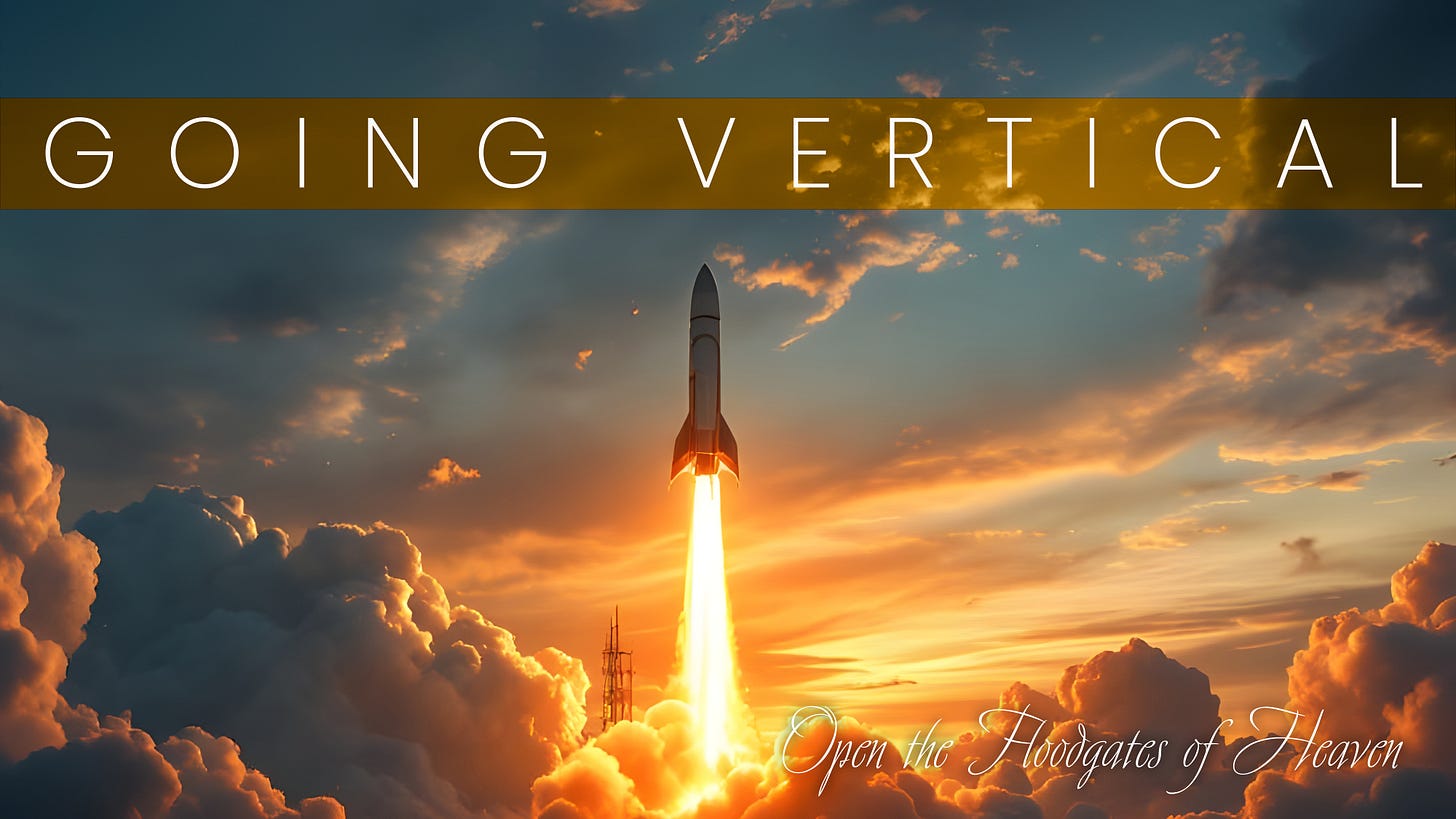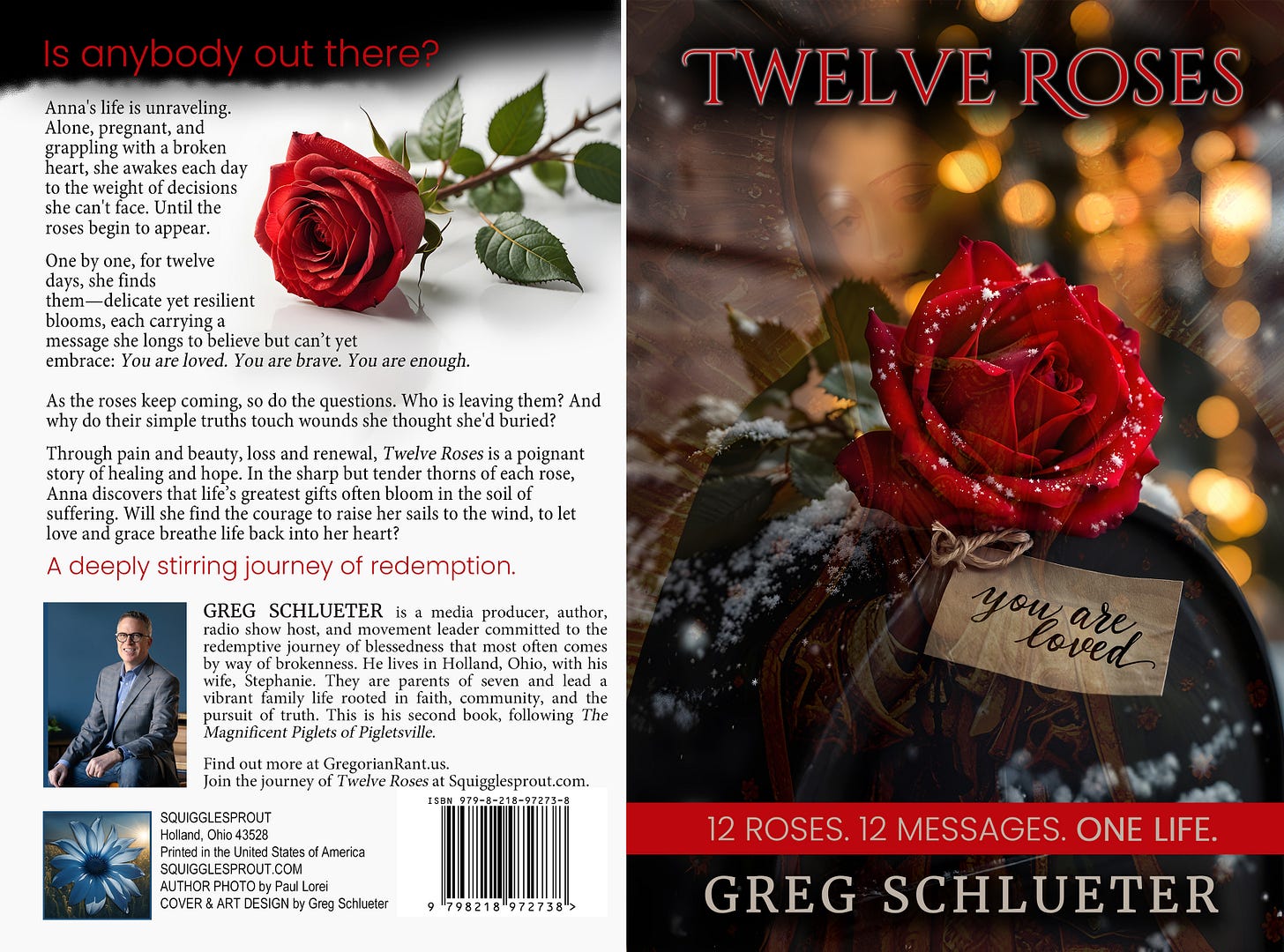Going Vertical
Open the Floodgates of Heaven
Houston, We Have a Problem
On April 13, 1970, the world held its breath.
An oxygen tank had exploded aboard Apollo 13, crippling the spacecraft. The mission was no longer about reaching the moon—it was about survival. Power dwindled. Carbon dioxide levels rose. And most critically, communication with Earth became tenuous.
The astronauts were adrift in silence, wounded, vulnerable, waiting for guidance. Everything depended on re-establishing connection with mission control.
To return home, their capsule had to plunge through a fiery reentry, passing through an expected three-minute radio blackout—a moment when no one on Earth would know if they had survived.
Three minutes passed.
Then four.
Then five.
APCOM (Capsule Communicator) Joe Kerwin in Mission Control kept calling out: “Apollo 13, this is Houston. Do you read me?”
At five minutes, fifty-three seconds, the moment everyone feared—that they had burned up, that they were lost—was stretching dangerously long.
And then—static. A crackle. And at last, a voice. “Okay, Joe.” The world exhaled.
They had made it. They were home.
At Some Level, We Know: We Have a Problem
Like those astronauts, many of us are drifting.
We are moving through life, carrying out our missions—working, serving, giving, praying, doing the right things—but something is missing.
The silence is deafening.
We do not hear God. We are not sure where He is, or worse, where we are.
At some level, we know: We have a problem.
And instinctively, something within us summons us into silence.
We put down the phone. We keep the TV off. We step away.
Maybe it happens in the car, in that brief moment between destinations, or in the rare quiet of morning before the world has sunk its claws into us. At first, the stillness is deafening. The mind, addicted to the hum of distraction, fights back. Thoughts crash like waves: that colleague’s remark, that ridiculous thing trending online, that list of unfinished tasks.
But if we endure—if we sit long enough—the futility of it all becomes clear.
The noise subsides.
And in that sacred silence, a door cracks open.
A Valley of Dry Bones
Ezekiel 37 paints a haunting image of spiritual desolation. The prophet is led by God into a vast valley filled with bones—dry, brittle, lifeless. An army reduced to remains.
"Can these bones live?" God asks.
We look around today, and the question feels eerily relevant.
Churches, once overflowing with vibrant faith, are now half-filled skeletons of what they once were. The structures remain. The traditions are intact. The words are still spoken.
But where is the fire? Where is the breath?
Like those bones, many of us have form but no life.
We serve. We pray. We give. We volunteer. We do good things. But when we are still, when we quiet the noise, an aching reality surfaces:
We do not know Him.
We have spent years in the horizontal—doing, performing, acting, achieving—without being sustained by the vertical.
And Jesus warned us of exactly this.
"I Never Knew You": The Most Terrifying Words in Scripture
One of the most sobering passages in all of Scripture is Matthew 7:22-23:
"Many will say to me on that day, ‘Lord, Lord, did we not prophesy in your name and drive out demons and perform many miracles?’ Then I will tell them plainly, ‘I never knew you. Depart from me.’”
Imagine hearing those words from the One who made you, the One you thought you were serving. Not because you rejected Him. Not because you didn’t work for Him. But because in all the doing, you never actually knew Him. You were never still enough to hear His voice. Never open enough to receive His breath.
This is not just a rejection—it is a devastating, tragic punctuation.
These people did everything right.
They prophesied in His name. They cast out demons. They performed miracles. They believed they were His.
And yet, they missed the one thing that mattered most.
They did not know Him.
The Greek word Jesus uses here is ginōskō—not just intellectual knowledge, but deep, intimate, life-giving communion.
This word carries the connotation of union, the same kind of knowing that describes the intimate bond between husband and wife. It is the knowing of relationship, of deep familiarity, of hearts beating together in unity.
Jesus is saying that on the last day, there will be those who did the works of God but never truly knew the heart of God.
They went through the motions of religion. They were successful in ministry. They had influence, impact, visible fruit. But they were never connected to Him.
And that—not their lack of good deeds, not their failure to be impressive, not their theological missteps—is what caused their rejection.
They missed the one thing necessary.
To know Him.
This should shake us to our core.
Because how many of us are caught in the same illusion? How many of us have mistaken religious success for intimacy with God? How many of us have spent years thinking that God wanted our works, when what He really wanted was our hearts?
This is what the saints understood.
The Struggle to Go Vertical: The Heart of Ginosko
For weeks now, I have recommitted to complete stillness before God the first thing in the morning. No agenda. No petitions. No devotional reading. Just being still. And in prayer, not just going horizontal—not seeking to be fed by something around me, even by the great prayers of the Divine Office, the readings of the day, or the Rosary. As vital as these are, before availing to the grace outpoured in these, I’m talking about something deeper. More fundamental.
I’m talking about going vertical—turning the deepest part of my soul to God. Not being filled with the needs, worries, or concerns of my day, or even with anyone or anything in my life. As important as these are, I’m talking about re-establishing my com-link to my God.
Simply because He is God.
Because He made my very being for Himself.
Because for my parched soul, He alone is the Streams of Living Water.
And without that connection—there is no real water.
Only a more parched me.
At first, it felt unnatural.
I would sit in silence, and my mind would immediately start racing—who needed prayer, what was happening in the world, the long list of responsibilities waiting for me. I felt the pull to pray for others, to do something holy, to not waste the time.
But I knew.
I knew God was there.
I knew He was summoning me—not just to more prayer, not just to more religious discipline, but to Himself. To heal me. To transform me. To be the very foundation of my life.
To know Him.
And then, the silence broke.
Like the static of Apollo 13 fading, I began to hear Him—not in words, not in visions, but in the deep Ginosko—the knowing of His presence. The very air of my soul changed. The weight lifted.
"One day in your courts is better than a thousand elsewhere." (Psalm 84:10)
And in that moment, I realized:
This was not religion.
This was not me asking God to do something for me.
This was mouth-to-mouth—the very root of adoration—the breath of God filling my lungs, bringing life to the dead bones within me.
And I came alive.
This is what happens when we go vertical.
God Himself prophesies to the dry bones—within ourselves and within the world. But will we be still long enough to let Him breathe His life into us? Will we step away from the noise long enough to hear His voice? Will we go vertical?
It is not just some holy religious undertaking of my own, but the very life of God taking territory through me.
And those around me feel it.
This is the core of transformation.
This is how the Kingdom is built.
"Be still and know that I am God."
So I challenge you:
Just ten minutes.
That’s all it takes to begin.
Ten minutes to be still.
Ten minutes to go and remain vertical.
Ten minutes to know Him.
Because when we do—
We will come alive.
And on that final day, when we stand before Him, may we not just know about Him.
May we not just tell Him what we did for Him.
May we look into His eyes, and may He say the only words that matter:
"I know you."
Be still and know.
FIND OUR MOVEMENT AT ILOVEMYFAMILY.US.



